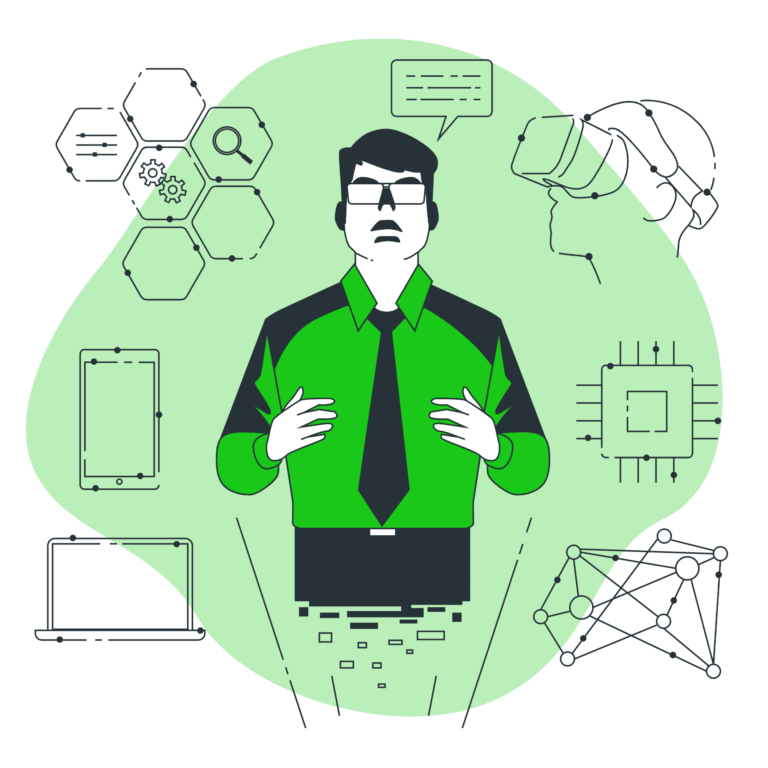Trending Technologies in 2023
- Author: Princee Rithikka
- Posted On: October 30, 2023
- Post Comments: 0

Table of Contents
ToggleTop Trending Technologies in 2023
In the world of fast-paced technology, innovation reigns supreme. Presently, exciting technology trends are reshaping our lives and how we work and connect. These technologies are not mere buzzwords; they mold our lives, industries, and how we connect with the world. In this post, we'll explore a few leading technologies of 2023, giving us a sneak peek into the future and their game-changing potential.
Here are some of the most important tech trends of 2023.
- Artificial Intelligence (AI) and Machine Learning (ML)
- Adaptive AI
- Superapps
- Metaverse
- Internet of Things (IoT)
- Industry Cloud Platforms
- Quantum Computing
- Blockchain and Cryptocurrency
A decade ago, AI, or artificial intelligence, began its ascent to popularity. Currently, it remains a prominent emerging technology, continually evolving with new applications. Today, widely used AI applications include image and speech recognition, navigation programs, and voice assistants like Siri and Alexa.
Organizations are increasingly employing AI to analyze customer and business interactions, uncover insights, and predict service demand, improving resource allocation.
Machine learning (ML), a subset of AI, employs supervised learning to acquire new functions. It's in high demand, attracting professionals. Forrester predicts that by 2025, AI and machine learning will create 9% of new jobs in the US.
These days, businesses are relying more on adaptive AI systems to enhance efficiency, accelerate time-to-market, and optimize resources. Adopting an AI model that can adapt and change with evolving conditions, requirements, or objectives enables businesses to access new data and personalize output algorithms for the long haul.
A super-app merges an application, platform, and ecosystem into a single app. Third parties can develop and publish custom "mini-apps" through it. Super-apps offer highly personalized and relevant digital UI and UX. They signal a shift in app design and development, enabling consumers to manage most enterprise systems through a single app.
The metaverse represents a digital world including people, places, and objects through virtual and augmented reality. Embracing the metaverse offers opportunities to boost engagement, encourage social interaction, enhance teamwork, and improve the user experience.
The Internet of Things (IoT) is expanding into virtually every aspect of our lives, from smart homes and wearable devices to industrial applications. The IoT landscape is growing as more devices and systems become interconnected. This interconnectedness enhances efficiency, improves data collection, and makes our lives more convenient. With 5G networks becoming more widespread, IoT devices can transmit and receive data at unprecedented speeds, leading to even more innovative IoT applications.
In the world of cloud services, we often buy and set them up separately. However, now they're merged into a pre-integrated industry cloud tailored for specific sectors. This industry cloud keeps things flexible, speeds up innovation, boosts organizational agility, and helps reach business goals faster.
Quantum computing, a promising realm in technology, offers unparalleled computational power. Currently, quantum computers are tackling complex problems previously unsolvable by classical ones. They can process massive amounts of data rapidly, possibly transforming cryptography, drug discovery, and climate modeling. As researchers and companies vie to harness quantum computing's potential, these advancements reflect our unwavering pursuit of knowledge.
Blockchain technology serves as the foundation for cryptocurrencies like Bitcoin, and its applications are expanding. It's now used in sectors like supply chain management, healthcare, and voting systems. Blockchain's decentralized and tamper-proof nature makes it a compelling choice for secure transactions and data verification.
Cryptocurrencies are gaining mainstream acceptance. They serve not only as an alternative payment method but also as investment assets and stores of value.
Conclusion
The top technology trends of 2023 offer exciting opportunities for businesses across various industries. These trends will reshape how companies operate, connect with customers, and provide products and services. Using artificial intelligence, robotics, blockchain, and other emerging technologies, businesses can streamline operations, innovate products, and improve customer experiences.
However, implementing these technologies demands a deep understanding of their capabilities and limitations, along with a creative mindset. Companies need to invest in research, adapt to market changes, and take calculated risks. Success in adopting these technologies will help businesses thrive in a dynamic business landscape.

